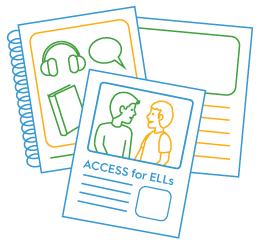Resources/Recursos
Featured Resources

WIDA Webinar recording: Instruction and Collaboration to Support Multilingual Learners With Disabilities

ACCESS Test Practice and Sample Items

Alternate ACCESS Sample Items
Sorry, no results found. Please try another search. If you are looking for test administration or technology documents, you may need to log into the WIDA Secure Portal or WIDA AMS. If you are looking for the ACCESS Checklist, go to your Member/State page.




